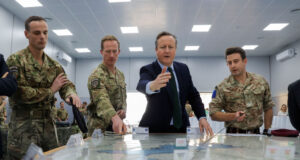It’s hard to imagine a better metaphor for the miserable state of UK politics than David Cameron flying across the Atlantic in the hope of convincing America to continue funding a bloody war on Europe’s doorstep — only to fail miserably. Over the past few days, the Foreign Secretary has met with a number of representatives of the Biden administration, as well as with key Republican leaders (including Trump himself), in an effort to unblock US funding for Ukraine. But in a continuation of his disastrous foreign-policy record, he has so far failed to raise a single dime.
Cameron used all the usual arguments: the rational, the emotional and the downright cynical. He said that if Russia isn’t defeated in Ukraine it will feel emboldened to invade other countries; and that Western support for Ukraine is “extremely good value for money”, as it has weakened Russia, created jobs at home and strengthened Nato “without the loss of a single American life”. He even gave an emotional performance in which he likened US support for Ukraine’s heroic struggle to his “grandfather landing on the Normandy beaches under the cover of an American warship”.
However, Republican hardliners who have been blocking Biden’s $60-billion Ukraine aid package were not impressed. For instance, while Cameron refused to give out any details about his meeting with Trump, we can assume that the latter wasn’t too inclined to help out the same person who, in the past, has described him variously as “stupid”, “wrong” and “misogynistic”. Elsewhere, Mike Johnson, the Republican House speaker who is holding back the vote on the Ukraine spending bill, couldn’t even be bothered to find time in his diary for Cameron.
In this respect, Cameron’s fundraising mission was nothing short of a disaster — yet it is one that is indicative of a broader problem within the British political establishment: their inflated sense of self, which in turn is rooted in national delusions about the US-UK “special relationship”. Almost 80 years since Churchill coined the term, the notion that the UK enjoys a privileged “subimperial” position among America’s Western allies continues to inform the country’s self-identity as one of the world’s great powers.
The reality, however, is that for a long time this “special relationship” has existed only in the minds of British elites. As for Americans, they were already likening Britain to a “butterfly content to flutter pathetically on the periphery of the world” in the pages of Time magazine in the Seventies. American officials have continued to pay lip service to the idea of the “special relationship”, but, as a senior Obama advisor later admitted, the US-UK bond “was never really something that was very important to the United States”. He added: “From my perspective it was very important for us to mention the special relationship in every press conference that we had when the UK people were here… but really we laughed about it behind the scenes”.
Similarly, Blinken’s reference to the “infamous special relationship” during a joint press conference with Cameron in December also had a sardonic air to it. And, during Cameron’s latest visit, we can imagine that there were similar scenes of mirth behind closed doors, after the Foreign Secretary spoke in grand Churchillian tones about the UK’s and US’s common responsibility to stand up for freedom and democracy in Ukraine.
Did Cameron really believe that he could wish Washington’s own propaganda into existence? Or was this simply another opportunity for him to steal a headline in what must surely be the final months of his zombified political career? Whatever the case may be, we must assume that Cameron is perfectly aware that the US has been working for some time to “Europeanise” the war — that is, to get Europeans to bear the burden of supporting Ukraine. They’ve also probably made peace, in national security circles, with the increasing likelihood that some kind of negotiated settlement is the only way to end the conflict — even if not before the next elections. In this sense, Trump’s peace plan “to end the Ukraine war in 24 hours”, by having Ukraine surrender the provinces of Donbas and Crimes in return for the war’s conclusion, probably enjoys much greater bipartisan support in the US than most are willing to admit.
After all, viewed in a realist sense, Washington can be said to have taken from this conflict what it wanted, in terms of driving a wedge between Europe (and Germany, in particular) and Russia, preventing the rise of a Eurasian geopolitical reality, and re-establishing America’s economic and military influence over Europe. This reality is going to remain unchanged even if the war should come to an end. Overall, then, Cameron was right to acknowledge that the US’s interests have been served quite well by the proxy war in Ukraine — for them, it really has been “good value for money”. The same, however, cannot be said of the UK — or Europe as a whole, which has suffered a huge economic blowback from the conflict, and is now facing the threat of an all-out war with Russia.
So, why is the UK leading the charge to further escalate the West’s involvement in Ukraine, doubling down on the military victory-at-all-costs narrative? Regardless of whether one takes the latter to mean the forceful return to pre-2022 or pre-2014 borders, there’s ample agreement, even in Western quarters, that either would be impossible to achieve without leading to a direct Nato-Russia war. What needs to give? And how should we explain the flippant way in which British leaders talk of how we have moved “from a post-war world to a pre-war world”?
One factor that arguably plays a role has already been mentioned: the British establishment’s distorted perception of the UK’s power. This goes a long way to explaining Britain’s increasingly aggressive posture against Russia, a country that, in military terms, dwarfs the UK in every possible respect: manpower, tanks, naval assets and aircraft. Moreover, the war in Ukraine has depleted British stocks to the point where Britain has run out of defence equipment to donate to Ukraine, while British-supplied artillery has run out of shells. As Lieutenant General Sir Rob Magowan admitted in a recent Defence Committee meeting, the UK would not be able to endure a conventional war with Russia for more than a couple of months.
One might argue that, in the eventuality of such a war, the UK would be part of a multinational Nato-led coalition. But other European countries face similar problems. As it is, the West is already unable to keep up with the artillery requirements of a geographically limited conflict such as the one unfolding in Ukraine. According to a recent estimate in the Financial Times, Russia’s annual artillery munition production has risen from 800,000 pre-war to an estimated 2.5 million, or 4 million including refurbished shells. EU and US production capacity, on the other hand, stands at about 700,000 and 400,000 respectively, although they aim to hit 1.4 and 1.2 million by the end of this year. More generally, meanwhile, it’s well understood that Nato’s armies are unprepared — in psychological as well as in military terms — for a long-running, symmetrical conventional war of the kind being fought in Ukraine, having been developed for completely different scenarios. So why are we even flirting with this possibility?
But perhaps the real question should be: how did we come to legitimise and even normalise the possibility of a large-scale war with Russia when deep down we all know that it would result in catastrophe, even if it remained limited to purely conventional measures? Our political and military leaders would likely reply that we don’t have a choice: that we are faced with an evil enemy bent on destroying us regardless of what we do. The implication is that there is nothing we can do to prevent this outcome; we can only prepare for it.
This deterministic narrative isn’t just untethered from reality; it’s also incredibly dangerous. As Nina L. Khrushcheva, a Russian-American professor of international affairs at The New School in New York, recently said: “Putin has not shown any desire to wage war on Nato. But, by stoking fear that he would, Nato risks creating a kind of self-fulfilling prophecy. Even I — a consistent critic of Putin — find this thoroughly provocative and foolish.”
The implicit message shouldn’t be underestimated: that whether Western leaders believe their own propaganda or not is irrelevant — what matters is how this is perceived in Russia. If the latter believes that Western countries are serious about the inevitability of war, it’s easy to see how it might conclude that Nato could decide to strike first at some point, and might therefore choose to pre-empt such as an attack by making the first move — as it did in Ukraine, but on a much larger scale.
This becomes all the more terrifying when we consider that we are dealing with a country armed with thousands of nuclear weapons. In the public debate, the risk of nuclear war is generally treated as an impossible scenario. Some even still maintain nuclear weapons act as a powerful deterrent against escalation.
Yet, none other than general Cristopher Cavoli, Nato supreme allied commander and head of US European Command, recently cautioned against the danger of thinking in these terms. Among other things, he noted that the US and Russia have virtually no active nuclear hotline, as they had during the Cold War, hugely increasing the risk of accidentally triggering a nuclear conflict, especially given the ongoing escalatory actions and rhetoric on both sides. “How,” he asked, “do we go ahead doing all of this and re-establishing our collective defence capability without being threatening and accidentally having the effect we don’t want?” The implication was that, by inflating the threat of war, we also risk conjuring it. And yet, only in January, it was reported that the US was planning to station nuclear weapons in the UK for the first time in 15 years.
This was the febrile context into which Cameron touched down in Washington this week, stoking further American intervention after which… who knows? In the best-case scenario, Cameron’s vanity trip will at least provide fodder for when he decides to write a second unreadable memoir. And in the worst? It’s all very good for Cameron to say that the war in Ukraine is “good value for money” — but as America’s politicians are starting to realise, the cost of nuclear war most certainly isn’t.
Disclaimer
Some of the posts we share are controversial and we do not necessarily agree with them in the whole extend. Sometimes we agree with the content or part of it but we do not agree with the narration or language. Nevertheless we find them somehow interesting, valuable and/or informative or we share them, because we strongly believe in freedom of speech, free press and journalism. We strongly encourage you to have a critical approach to all the content, do your own research and analysis to build your own opinion.
We would be glad to have your feedback.
Source: UnHerd Read the original article here: https://unherd.com/




